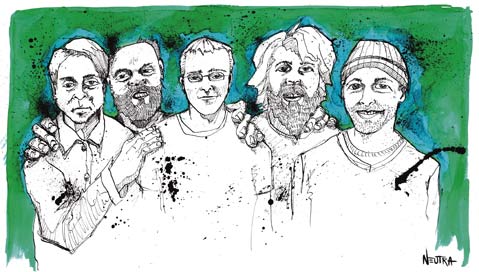Built to Spill Return, Headline SOhO
Frontman Doug Martsch Talks Indie Rock Stardom

Somewhere, somehow the idea started circulating that the lyrics Doug Martsch—frontman of Built to Spill and one of the major indie rock icons of the past two decades—writes lack personal meaning. But a close listen to the tracks from the band’s most recent record, There Is No Enemy, destroys that theory. Martsch recently described to me the complications following his eye surgery for a detached retina, which inspired the song “Good Ol’ Boredom.”
“Basically, I had to spend, I think, maybe three weeks with my head facing down all the time. I had a gas bubble holding my retina in place, so my face had to be parallel to the ground all the time. I had to sleep facedown. I had to do everything—except get eye drops a few times a day—with my face down. And I wasn’t sure if I was going to go blind in one eye while this was all happening. After the gas bubble in my eye was gone, the vision in my eye came back, but it was really limited and distorted. Looking around, I was seeing really bad double vision all the time.”
Though his sight has since improved, Martsch has still not fully recovered from the ordeal, which he described as “almost like leaving the world, in a way.”
“I can see things in 3-D but there’s, like, a ghost of an image everywhere. Anyway, this was very disconcerting for me, especially because I had always had really good vision and I always liked it and I’d always appreciated it and it was an important part of my life. So basically the song is just welcoming boredom. You know, going from misery to boredom—where boredom sounds fucking awesome.”
The lyrics are the songwriting component with which Martsch struggles most. “I usually have a batch of songs without lyrics at any given time,” he said. “Lyrics are important to me. They have to be satisfying to me—and that can mean different things. It doesn’t necessarily mean they have to be life-changing words or anything, but they have to be satisfying in some sort of way.”
Given the strength of the band’s many extended instrumental passages, it seems plausible that Martsch could abandon some of his lyrics altogether and just record the songs without vocals, but this is something that Built to Spill have yet to do. “For some reason, I’m stuck in this idea that there has to be singing in order to really relate to the music on the level that I want the music to be related to. And I want this stuff to be special, you know? And there’s not very much instrumental music, to me, that’s really special, that really speaks to you on a deep level. Maybe that’s not even true, but that’s sort of how I feel.”
There’s a restlessness apparent in Built to Spill, partly due to the band’s reputation for unpredictable live shows and their encyclopedic repertoire of covers, but also because of their constantly evolving catalog of records. From the sprawling jams of Perfect from Now On to the concise hooks of Keep It Like a Secret to the meandering meditations of You in Reverse, it’s difficult to predict what sounds they will incorporate in the future. Take the out-of-left-field trumpet solo on “Things Fall Apart.” “That was a guitar solo that I made up,” Martsch explained. “And then I thought, ‘Oh, that would sound nice if it was a cello or something.’ And then somewhere I just thought, ‘Oh, a trumpet!’ and then worked hard with the trumpet player. It took a lot of tries. It took a couple sessions, a few hours each session to nail it.”
It’s an example of the idea that good musicians know when not to play. “All we’re trying to do is service the song. Whatever the song needs, we’ll try to get it. And I think we’ve done that with mixed success.”
As for the group’s legacy, Martsch, now 40, denies that he has ever considered where Built to Spill fit into the indie rock canon, even challenging the idea that his band has influenced legions of budding rockers. Few people try harder to keep their own hype in check. “I don’t hear us in anything. I don’t really hear a Built to Spill sound, you know, even in our music. To me, I feel like we’re taking a lot of different influences and messing with them. I’ve never thought of us as a terribly original band.”
Despite their success, the creative struggle continues. “Music is always a nonstop challenge, especially for someone like me who’s just sort of a functional musician. Every step of the way, it’s a lot of work for me.”
4•1•1
Built to Spill play SOhO (1221 State St.) on Tuesday, July 13, at 8 p.m. with openers Fauxbois. For tickets and info, call 962-7776 or visit clubmercy.com.



